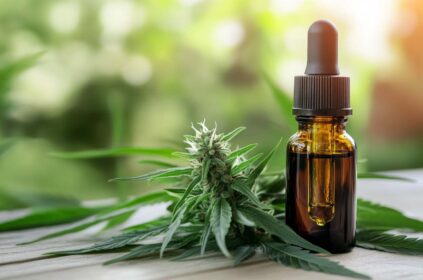Understanding CBD’s Interaction with Serotonin Receptors: A Comprehensive Guide
Introduction
In the realm of mental health and wellness, the interplay between various neurotransmitters and external substances has become a focal point of research. One such interaction that has garnered significant attention is the relationship between CBD (cannabidiol) and serotonin, a crucial neurotransmitter influencing mood, emotions, and several other bodily functions. This guide delves into the details of how CBD interacts with serotonin receptors, its potential benefits, and the current state of research in this area.
Serotonin: The Role in the Body
What is Serotonin?
Serotonin is a neurotransmitter that plays a pivotal role in regulating various bodily functions, including mood, sleep, appetite, digestion, and even blood clotting and sexual desire. Its multifaceted nature makes it essential for a balanced life.
- Mood Regulation: Serotonin is closely associated with happiness, focus, and overall calmness. It stabilizes emotions and maintains overall well-being.
- Digestive Functions: Interestingly, around 90% of the body’s serotonin is found in the gut, where it aids bowel function and regulates appetite.
- Sleep-Wake Cycle: Serotonin influences the sleep-wake cycle significantly, contributing to melatonin production—the hormone responsible for inducing sleepiness.
- Other Functions: It also plays a role in metabolism, cognitive function, concentration, hormonal activity, body temperature, and blood clotting.
Imbalances and Health Conditions
Imbalances in serotonin levels can lead to several health concerns, including depression, anxiety, insomnia, and digestive issues. Low serotonin levels, in particular, are strongly linked to an increased risk of developing these conditions. For instance, research indicates a correlation between low serotonin and the prevalence of mood disorders, suggesting that maintaining optimal serotonin levels is crucial for mental well-being.
CBD and the Endocannabinoid System
How CBD Works
CBD (cannabidiol) is a non-psychoactive compound derived primarily from the hemp plant. Unlike THC (tetrahydrocannabinol), CBD doesn’t produce a “high,” leading to its rising popularity in wellness communities. It interacts primarily with the endocannabinoid system (ECS), a complex system that regulates various physiological processes, including mood and emotional responses.
The ECS consists of two main types of receptors—CB1 and CB2. CB1 receptors are mainly found in the brain and central nervous system, while CB2 receptors are primarily located in the immune system and peripheral organs.
Interaction with Serotonin Receptors
Research has shown that CBD can interact with serotonin receptors, particularly the 5-HT1A receptor, in several ways:
- Agonist Activity: CBD acts as an agonist at the 5-HT1A receptor, meaning it binds to this receptor and increases the effects of serotonin. This mechanism is believed to contribute to CBD’s potential antidepressant and anti-anxiety properties.
- Allosteric Modulation: It can also act as an allosteric modulator of the 5-HT1A receptor, facilitating the binding of endogenous ligands and agonists. This modulation may enhance the therapeutic effects of serotonin, providing a significant boost to mood and emotional stability.
- Tryptophan Suppression: CBD has been shown to suppress the degradation of tryptophan, an essential amino acid that is a precursor to serotonin. By increasing the bioavailability of tryptophan, CBD can lead to higher serotonin levels within the body.
Benefits of CBD on Serotonin-Related Conditions
The interaction between CBD and serotonin has promising implications for various health conditions related to mood and emotional well-being. Here are a few key benefits:
Mood Enhancement
The connection between CBD and serotonin receptors can significantly enhance mood regulation. By increasing serotonin levels and augmenting its effects, CBD may help alleviate symptoms of depression and anxiety. Individuals who use CBD often report an improved mood and a greater ability to cope with stress.
Sleep Improvement
CBD’s influence on serotonin is beneficial for sleep quality as well. Since serotonin contributes to melatonin production, CBD has the potential to regulate the sleep-wake cycle effectively, leading to deeper, more restorative sleep.
Anxiety and Stress Relief
The anxiolytic effects of CBD are partially attributed to its interaction with serotonin receptors. By activating the 5-HT1A receptor, CBD can reduce anxiety and stress levels, promoting a sense of calm and emotional well-being. Many users have found CBD to be a helpful tool in managing everyday stressors.
Digestive Health
Given the significant role serotonin plays in digestive functions, CBD’s interaction with serotonin receptors may benefit digestive health as well. It may help regulate bowel function and alleviate symptoms common to digestive disorders such as irritable bowel syndrome (IBS).
Best Methods for Taking CBD to Impact Serotonin
When considering how to use CBD to support emotional and mental well-being, the method of consumption can greatly affect its efficacy. Here is a commonly recommended approach:
Sublingual Administration
Sublingual administration, where CBD oil is placed under the tongue, allows for rapid absorption into the bloodstream. This method maximizes the impact on serotonin levels and mood regulation. Users typically report feeling effects faster with this approach versus other methods like edibles or capsules.
Conclusion and Future Research
The interaction between CBD and serotonin receptors holds significant potential for managing various health conditions related to mood and emotional well-being. While current research is promising, further studies are necessary to fully understand the mechanisms involved and the long-term effects of this interaction.
Key Takeaways
- Serotonin’s Role: Recognize the essential functions of serotonin in mood regulation, sleep, digestion, and other physiological processes.
- CBD’s Interaction: Understand how CBD interacts with serotonin receptors, particularly the 5-HT1A receptor, to enhance serotonin’s effects.
- Potential Benefits: Be aware of the possible benefits of CBD in addressing depression, anxiety, sleep disorders, and digestive issues through its interaction with serotonin.
- Best Practices: Utilizing sublingual administration of CBD oil is recommended for optimal absorption and effectiveness in mood regulation.
Next Steps
For individuals considering CBD as a supplement to support mental health and well-being, it is crucial to:
- Consult with a healthcare professional to determine the best approach for treatment.
- Select high-quality CBD products from reputable sources, ensuring they undergo third-party testing for purity and potency.
- Monitor and adjust dosage based on individual responses, taking note of any effects or improvements in mood and anxiety levels.
As research continues to unveil the complexities of the CBD-serotonin interaction, it is evident that this area holds substantial promise for advancing our understanding and treatment of various mental health conditions. The journey into the world of CBD and its beneficial effects on serotonin receptors could significantly enhance the quality of life for many seeking natural alternatives for emotional well-being.




















